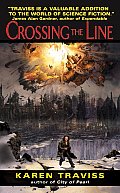
| Series: | Wess'Har #2 |
| Publisher: | Eos |
| Copyright: | November 2004 |
| ISBN: | 0-06-054170-9 |
| Format: | Mass market |
| Pages: | 373 |
I'm beginning to understand why the reviews in Locus of each book in this series after the first all had spoiler warnings. It's remarkably difficult to write a review of the second book in the series without spoiling City of Pearl; the ending of the first book is hugely important for the shape of the story. Still, I have a mild obsession with spoiler-free reviews and hesitated to pick up this series in part because I skipped over most of the reviews to avoid spoilers and therefore had little feel for it. So I'll give it a shot.
City of Pearl was about politics writ relatively small: a human colony, a disputed world, and four civilizations in conflict over it. Crossing the Line takes some of the same political conflicts, adds conflicts over the discoveries in the previous book, and increases the stakes and the level of involvement by all four civilizations. There are fewer personal decisions made on the spot in the absence of context and more personal representation of sides. But as in City of Pearl, Traviss maintains strong individual characterization and does a good job of focusing on the struggles of individuals within a the larger context.
Even more than with City of Pearl, it's hard to read Crossing the Line without rooting against the humans. It's a bit risky to cast the human race as essentially the villains, and I suspect some readers will find Traviss's approach preachy. It worked for me, though. The alienating effects of seeing human colonial and expansion behavior from an external perspective makes the book a rather blunt mirror, but I think it's an effective and mostly fair one.
It helps that Traviss lets individual people be heroic in their own lights and do the best they can with the situation they're in. I already liked Eddie, the journalist, in City of Pearl, but he won me over completely in Crossing the Line. I think Traviss does a great job writing an investigative reporter who isn't some sort of brave superman but who takes reporting seriously, struggles with what it means to be embedded, and is affected by and takes moral stands around what he sees. I think he was the most successful character in this book, in part because he handles being out of his depth the best. Many of the other characters did bother me a bit (though realistically) with second-guessing, difficult adjustments, and occasional trouble communicating.
Another hard lesson from Crossing the Line is that doing what you think is right at each step can lead to horrific actions when you're being deceived and manipulated, or when you're not looking at the bigger picture. The Wess'har serve as an intriguing stand-in for the impersonal laws of physics, which don't care about your motivations or intentions, only about whether you took the correct action. They provide a similar sort of absolute backstop on moral decisions. One may or may not agree with them, but they're completely uncompromising, and it's fascinating to watch how foreign that is to the human characters in this series. This, too, is risky, since one of the normal qualities of moral decisions is that they're not obviously clear-cut, but I never felt like Traviss was setting up an artificial situation to make humans look bad. Rather, it felt more like she's adding realistic complexity and showing how simple, limited, or parochial attitudes go down horrible paths in complex situations in a series of defendable steps.
If one takes a step back and looks at the series as a whole, this is pointedly political, anti-colonial, ecological fiction that includes sharp critiques of corporate dealings with the rest of the world, oligarchical capture of goverments, and the human attitude towards environments. But Traviss packs it with so much escalating action, deep characters, and events that truly matter and reshape the rest of the story that I never bogged down in the message. It's a great, fast-moving story that happens to have a fairly strong moral vision of the universe as its backstop.
Only two books in, this is already one of the best series I've read for avoiding episodic resets. Each event in the book truly matters and reshapes the story that follows, and some of them caught me entirely by surprise. I suspect this will make reviewing without spoilers harder and harder as the series goes on, but the reviewer's loss is the reader's gain. If you want a strong SF series in which each book matters, this is looking like it will be one of the best I've read.
Followed by The World Before.
Reviewed: 2009-05-25